
I gotta say, this blogging stuff was so much easier when Dr. Barresi was saying crazy stuff to local news stations for me to excerpt and mock. Of course, the #WTF? stuff is always more fun than the #WhatNow? parts – just ask any Middle Eastern country on the long side of revolution in the past decade.
It’s taken me awhile to get to the dramatic conclusion of this epic, so let’s review – “Previously, on Blue Cereal Education Dot Com…”
Part I – I made the case that land ownership was central to citizenship, suffrage, and participation as a ‘full American’. This seemed reasonable, and by the standards of the day was a huge expansion of democracy and the ability of the ‘common man’ to claim a voice in his government. It did not, however, include everyone we would consider appropriate today – it was a white man’s game.
Part II – Land ownership carried mythical benefits alongside the practical. In addition to being a source of opportunity, income, and republican (small ‘r’) participation, it promoted an agricultural lifestyle – hard work, responsibility, patience, and fortitude. I’d include ‘grit’, but I’d need a ‘trigger warning’ – people are touchy about that one for some reason…
Part III – The combination of practical needs, terrestrial benefits, and supernatural calling led an expanding ‘Merica to treat the Native populations and Mexico as obstacles to overcome rather than peoples to be engaged. The grand ‘us’ and ‘them’ of human history continued.
Part IV – Land ownership becomes a condition as much as an accomplishment. Because not everyone can ‘have’, those who do come to see themselves not as the most fortunate but as the most deserving. Those unable to procure land due to race (or gender, or whatever) were already categorized as ‘less than’ (hence their ineligibility), and this lack of opportunity became circular. Chickens and eggs – which came first, the unworthiness to be a full American or the lack of opportunity to fully participate in the republic?
Part V – Education is the new land. We advocate universal access. We extol it as the key to all things – fiscal opportunity, social advancement, moral purity, personal fulfillment. As with land, lack of access becomes lack of worthiness. Inequity leads to inequality leads to rejection leads to judgment – ‘us vs. them’ with a side of ‘what the hell is wrong with you people?’
Part VI – I suggested we’re doing with students and education what we spent a century and a half doing with various demographics and land ownership and a voice in the republic. I argue that we’ve conflated ability, opportunity, and values with personal worth and potential – to the harm of a substantial percentage of our kids.
I closed with a vague promise to resolve that in this final post.
But I can’t.
It’s just too big. Too many cultural, psychological, logistical, fiscal, emotional, and historical factors out of our control – some completely, others merely mostly.
I can shine some light on the nature of the problem. We may even find some consensus about what’s WRONG. The hard part is in the fixin’ – what we do INSTEAD. That’s the problem with revolutions – you may get enough people to agree about what to tear down, you just can’t get enough people to agree what to build in its place.
I have some more great analogies – one in which we demand coaches train their athletes in a wide variety of sporting events but we only measure races with hurdles, and we keep raising the hurdles for the kids who can’t jump them or who refuse to stay on our track. That’s a good one. There’s another in which some stuffy doctors present research showing the richest and healthiest people in the world eat mostly vegetables and pâté, so they push through legislation mandating a vegetable and pâté diet (without providing the funding to properly prepare either). That was fun, too – and it had the cutest clip-art.
The point of the first, of course, was that hurdles are an inadequate measure of all possible athletic ability, and that not everyone has the same athleticism or interest – for a wide variety of reasons. The second was about correlation and causation – the rich and healthy eat pâté; pâté doesn’t make you rich and healthy. Successful students pass stupid tests; stupid tests don’t create successful students. Like I said, I was pretty amused by them.
But I’ve already laid out six posts of historical analogies involving land and culture and race. These not only make it sound like I’m smarter than I actually am, but they correlate in a very real way with actual problems in education today.
It’s time to fix it.
Are the schools going to be a part of that? They’d have to, I’d think. But they’re not enough.
We need to change the way we think about race and poverty and culture and American values. I’m a big fan of our founding documents and ideals – heck, I even still like capitalism. But we’ve managed to maintain an ugly leavening of racism, elitism, and outright social Darwinism through too many eras to believe it’s not deeply entrenched in the problems we face today.
We need to ask ourselves why so many kids from so many backgrounds find so little of value in the curriculums we push, or the values we demand they share. At best, much of what we prioritize seems pointless to them; at worse, it contradicts who they believe they are and the things they value. Ask your best students their honest opinions about what they’re learning in school – some find parts they really like, but I’m horrified how many confess they’re just doing what they’ve been told to do. They endure, and they get the grades, but that’s all.
It’s like being at the dentist for 13 years straight.
If we can look in the mirror and tell ourselves with conviction they’ll thank us someday because we know what’s good for them and they don’t, OK. Maybe so. But what did YOU carry away from High School that changed your life? Improved your world? Gave meaning to some part of your existence? If you CAN think of something, was it in the curriculum, or did it come from somewhere else?
It seems like most of what we do in school serves only to prepare students to do more of it in more school. That’s not just pointless – it’s unethical and abusive.
And stupid.
The title “40 Credits & A Mule” was inspired by several blog posts by P.L. Thomas about our American myth that students from poor families – especially students of color – who do well in school can overcome their background to the extent they’ll end up economically and socially on par with white peers. They don’t. Their circumstances improve, but you’re better off being a white high school dropout than black with a few years of college in terms of lifetime earnings.
The promise is there, you see – but it’s not substantiated by reality.
I don’t know how we fix it, but I think it begins when we refuse to perpetuate the lie. We refuse to give the tests that rank our kids by ZIP Code while claiming to rank them by accomplishments.
We refuse to follow the outdated factory structure mandated by our states and our expectations.
We refuse to continue forcing so many kids into a choice only between rejecting our system and everything it stands for OR accepting themselves as failures – unworthy players in the only game in town.
We refuse to turn our best and brightest into cynical rule-followers forced to seek ways to escape the reality of their daily grinds rather than embrace the many wonderful ways life can be lived productively and meaningfully.
We make them fire us and justify it. We make them cut our funding and explain it. We let them try to find someone to replace one of us, ten of us, a hundred of us, because we won’t do this to our kids anymore.
Let the State tell the papers why our entire graduating class doesn’t get diplomas. Let the universities explain why they won’t admit any of the thousands of young adults whose value we refuse to measure with a single number between 0 and 4 any longer.
I think I’m advocating revolution. Starting with you, and me, and like, one other guy who’s already pretty weird and we may not actually want on our team. If we were to win, I have no idea what we put up in place of what we’re doing now, but I know this has to stop.
That will probably be a non-issue for us, anyway. We’ll be early casualties, not heroes or leaders. And when we go down, I’m not sure anyone else is picking up this flag. Still… could be fun, don’t you think?
Wanna get in trouble with me?
[[{“type”:”media”,”view_mode”:”media_small”,”fid”:”450″,”attributes”:{“alt”:””,”class”:”media-image”,”typeof”:”foaf:Image”}}]]
[[{“type”:”media”,”view_mode”:”media_small”,”fid”:”453″,”attributes”:{“alt”:””,”class”:”media-image”,”typeof”:”foaf:Image”}}]]
[[{“type”:”media”,”view_mode”:”media_small”,”fid”:”451″,”attributes”:{“alt”:””,”class”:”media-image”,”typeof”:”foaf:Image”}}]]
[[{“type”:”media”,”view_mode”:”media_small”,”fid”:”255″,”attributes”:{“alt”:””,”class”:”media-image”,”typeof”:”foaf:Image”}}]]
[[{“type”:”media”,”view_mode”:”media_small”,”fid”:”452″,”attributes”:{“alt”:””,”class”:”media-image”,”typeof”:”foaf:Image”}}]]
Related Post: 40 Credits & A Mule, Part I – This Land
Related Post: 40 Credits & A Mule, Part II – Chosen People
Related Post: 40 Credits & A Mule, Part III – Manifest Destiny
Related Post: 40 Credits & A Mule, Part IV – The Measure of a Man
Related Post: 40 Credits & A Mule, Part V – Maybe Radio
Related Post: 40 Credits & A Mule, Part VI – Slytherin, Ravenclaw, or Gryffindor?
Related Post: I See The Difference In Educational Privilege Every Day… (From the Washington Post / Daily Kos)


 Consider Alyssa – a wonderful young lady in AP classes from a two-parent Methodist family. She works hard, makes good grades, stays out of any real trouble, and wants to be a neuroscientist. Obviously she deserves some credit for her accomplishments. She’s demonstrated great capability, and made good decisions.
Consider Alyssa – a wonderful young lady in AP classes from a two-parent Methodist family. She works hard, makes good grades, stays out of any real trouble, and wants to be a neuroscientist. Obviously she deserves some credit for her accomplishments. She’s demonstrated great capability, and made good decisions. Compare her to Dionne – another wonderful young lady, but one from very different circumstances. Her life might be happy enough, or it might be reality-show dysfunctional, but in any case does NOT unfold in the same universe as Alyssa’s. All of the rules are different and their experiences mutually exclusive.
Compare her to Dionne – another wonderful young lady, but one from very different circumstances. Her life might be happy enough, or it might be reality-show dysfunctional, but in any case does NOT unfold in the same universe as Alyssa’s. All of the rules are different and their experiences mutually exclusive. Anders is my Amerindian, although he might be Hispanic, or White, or Black, or whatever – there are racial issues wound up in these, but they’re not exclusive or always definitive. Many Amerindians had no interest in the Anglo-American value system or way of life, but they were forced to partake – and stakes were high if they failed. They lacked buy-in, but they also were denied good tools, seed, land, etc. It’s not much of a stretch to think a comparable state exists between many teenagers and whatever public school system holds them captive in 2015.
Anders is my Amerindian, although he might be Hispanic, or White, or Black, or whatever – there are racial issues wound up in these, but they’re not exclusive or always definitive. Many Amerindians had no interest in the Anglo-American value system or way of life, but they were forced to partake – and stakes were high if they failed. They lacked buy-in, but they also were denied good tools, seed, land, etc. It’s not much of a stretch to think a comparable state exists between many teenagers and whatever public school system holds them captive in 2015. You’re so thankful for Alyssa – students like her give you the energy to get through the day. But how often is Alyssa essentially rewarded for her upbringing and Dionne marginalized for not ‘working hard enough’? How angry does Anders make you even though he doesn’t really do anything to you other than not be taught? Zack’s an annoying little turd, but he’s passing and no one’s mad at you because of him so… whatever.
You’re so thankful for Alyssa – students like her give you the energy to get through the day. But how often is Alyssa essentially rewarded for her upbringing and Dionne marginalized for not ‘working hard enough’? How angry does Anders make you even though he doesn’t really do anything to you other than not be taught? Zack’s an annoying little turd, but he’s passing and no one’s mad at you because of him so… whatever.


 It’s dangerous to project backwards regarding motivations and intentions, but it seems that even when public education was barely a thing, they realized it would soon become essential if their sons were to flourish in the next generation. I don’t know if they were worried about ‘personal fulfillment’ stuff as well, but I’m an idealist, so… let’s assume maybe they did.
It’s dangerous to project backwards regarding motivations and intentions, but it seems that even when public education was barely a thing, they realized it would soon become essential if their sons were to flourish in the next generation. I don’t know if they were worried about ‘personal fulfillment’ stuff as well, but I’m an idealist, so… let’s assume maybe they did. 
 Then crop failure, drought, and flood were no longer little deaths within life, but simple losses of money. And all their love was thinned with money, and all their fierceness dribbled away in interest until they were no longer farmers at all, but little shopkeepers of crops… Then those farmers who were not good shopkeepers lost their land to good shopkeepers. No matter how clever, how loving a man might be with earth and growing things, he could not survive if he were not a good shopkeeper. And as time went on, the business men had the farms, and the farms grew larger, but there were fewer of them…
Then crop failure, drought, and flood were no longer little deaths within life, but simple losses of money. And all their love was thinned with money, and all their fierceness dribbled away in interest until they were no longer farmers at all, but little shopkeepers of crops… Then those farmers who were not good shopkeepers lost their land to good shopkeepers. No matter how clever, how loving a man might be with earth and growing things, he could not survive if he were not a good shopkeeper. And as time went on, the business men had the farms, and the farms grew larger, but there were fewer of them… This is not my anti-capitalism rant. I’ll leave that to Tom Joad and his spirit moving among the hungry children and such. I’m more or less a Libertarian, but the Libertarian Ideal in MY interpretation requires a capable citizenry with actual options and real opportunity. It’s fine to support free will and full consequences for our actions, but to believe this and sleep at night we need something akin to a ‘equitable starting position’ or the proverbial ‘level playing field’.
This is not my anti-capitalism rant. I’ll leave that to Tom Joad and his spirit moving among the hungry children and such. I’m more or less a Libertarian, but the Libertarian Ideal in MY interpretation requires a capable citizenry with actual options and real opportunity. It’s fine to support free will and full consequences for our actions, but to believe this and sleep at night we need something akin to a ‘equitable starting position’ or the proverbial ‘level playing field’.  Ma was right – no one knew what it was gonna be like. Rose was pregnant, so that’s literary, and Connie – ironically – wasn’t far off track in terms of how the future was going to work for those able to claim it. As in, NOT the Joads.
Ma was right – no one knew what it was gonna be like. Rose was pregnant, so that’s literary, and Connie – ironically – wasn’t far off track in terms of how the future was going to work for those able to claim it. As in, NOT the Joads. 
 I
I  The Senate was intended to be the more austere, deliberative body – holding longer terms and intended as a balance on the more reactionary House of Representatives, elected every two years and thus presumably more responsive to the whims of the people. Jefferson’s parenthetical commentary is a nod to the superior role and trustworthy wisdom of the crude mess-secretors from a few sentences before.
The Senate was intended to be the more austere, deliberative body – holding longer terms and intended as a balance on the more reactionary House of Representatives, elected every two years and thus presumably more responsive to the whims of the people. Jefferson’s parenthetical commentary is a nod to the superior role and trustworthy wisdom of the crude mess-secretors from a few sentences before.
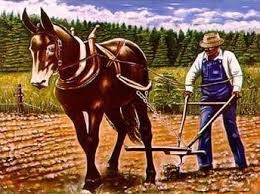 These few instances were reversed to smooth the transition into Reconstruction and maintain the almost cultish commitment Americans had to property rights – and, apparently, irony. The freedmen received nothing.
These few instances were reversed to smooth the transition into Reconstruction and maintain the almost cultish commitment Americans had to property rights – and, apparently, irony. The freedmen received nothing.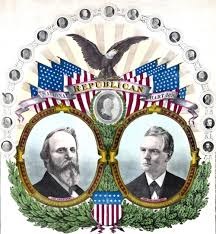 You all remember Hayes, right? A President for whom it was worth giving up the closest we’d ever come to realizing our founding ideals?
You all remember Hayes, right? A President for whom it was worth giving up the closest we’d ever come to realizing our founding ideals?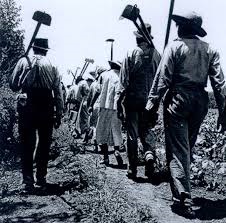 That’s the suffrage part. If Jefferson was correct about the spiritual and moral benefits of ‘laboring in the earth’, working the land of another may or may not have been worth partial divine credit. In terms of ‘vested interest’ in our national success, whatever support black Americans lent to their country came without terrestrial reciprocation.
That’s the suffrage part. If Jefferson was correct about the spiritual and moral benefits of ‘laboring in the earth’, working the land of another may or may not have been worth partial divine credit. In terms of ‘vested interest’ in our national success, whatever support black Americans lent to their country came without terrestrial reciprocation.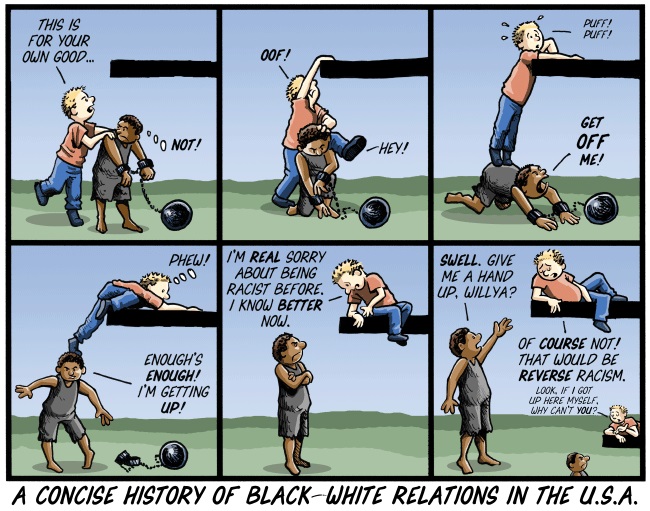
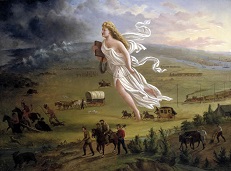 When my kids were little, we used to go to Bishop’s Cafeteria to eat with my dad. He was old, and old people like cafeterias – so we went.
When my kids were little, we used to go to Bishop’s Cafeteria to eat with my dad. He was old, and old people like cafeterias – so we went. 
 “DAD!”
“DAD!” 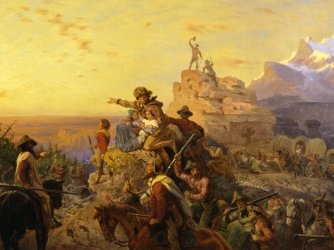 I’m overgeneralizing, of course – there were hundreds of tribes and cultures and such – but by and large, they weren’t doing proper America things with the lands they claimed as theirs. And, as with the Jello, subjected to repeated wiggling but remaining unconsumed, our frontiersmen forebears weren’t impressed by the arguments of those claiming that land ownership requires neither cultivation nor mall-building.
I’m overgeneralizing, of course – there were hundreds of tribes and cultures and such – but by and large, they weren’t doing proper America things with the lands they claimed as theirs. And, as with the Jello, subjected to repeated wiggling but remaining unconsumed, our frontiersmen forebears weren’t impressed by the arguments of those claiming that land ownership requires neither cultivation nor mall-building. 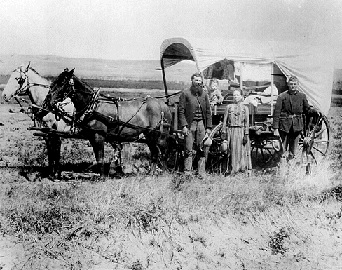
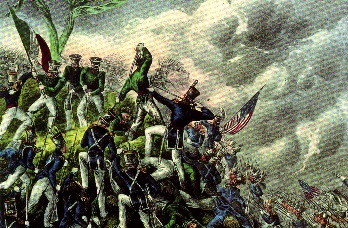 Conflict with Mexico was not much different. Their culture was nothing like most Amerindian peoples, but neither did we particularly fathom or appreciate their social structure, economic mores, or anything else – nor they ours. Perhaps outright disdain for one another played a larger role than with the Natives, and certainly by that point the sheer momentum of Westward Expansion eclipsed whatever underlying values or beliefs had fueled it a generation prior, but whatever the immediate motivations, the same sense of unquestioned rightness oozed from the words and letters of those pinche gabachos
Conflict with Mexico was not much different. Their culture was nothing like most Amerindian peoples, but neither did we particularly fathom or appreciate their social structure, economic mores, or anything else – nor they ours. Perhaps outright disdain for one another played a larger role than with the Natives, and certainly by that point the sheer momentum of Westward Expansion eclipsed whatever underlying values or beliefs had fueled it a generation prior, but whatever the immediate motivations, the same sense of unquestioned rightness oozed from the words and letters of those pinche gabachos  They were assigned a value system and lifestyle they didn’t want, with the full weight of state and federal governments forcing compliance. They were assigned the worst land on which to practice this new system, and given inadequate tools and other supplies. The stakes were incredibly high – at best, they were expected to emulate those with the right equipment, in which case they could perhaps almost survive as second-class citizens. More likely, they would fail, starve, or simply give up – this not being a game they’d wished to play anyway.
They were assigned a value system and lifestyle they didn’t want, with the full weight of state and federal governments forcing compliance. They were assigned the worst land on which to practice this new system, and given inadequate tools and other supplies. The stakes were incredibly high – at best, they were expected to emulate those with the right equipment, in which case they could perhaps almost survive as second-class citizens. More likely, they would fail, starve, or simply give up – this not being a game they’d wished to play anyway.